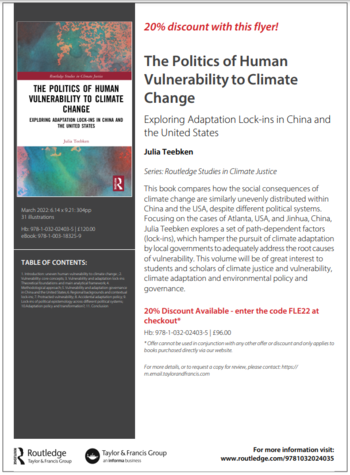New book by Dr. Julia Teebken "The Politics of Human Vulnerability to Climate Change"
In her new book, Dr. Julia Teebken analyses human vulnerability to climate change in Atlanta, USA and Zheijang, China. She shows how maladaptation can have adverse effects on vulnerable groups - creating path dependencies that further hinder transformative adaptation.
News from Apr 11, 2022
Julia Teebken’s book "The Politics of Human Vulnerability to Climate Change. Exploring climate adaptation lock-ins in China and the United States" was just released with Routledge's new Climate Justice series. The book shows how social inequality manifests in the context of climate change. It analyzes why social vulnerability to climate change impacts is so difficult to address along with different political systems. The work is based on two empirical case studies, Atlanta in the federal state of Georgia in the southeastern United States and Jinhua in the eastern Zhejiang province, China. Both cases are characterized by strong social and geographic vulnerability to climate change impacts. At the same time, both cities exhibit strong adaptation deficits.
In both cases, policy measures leading to climate adaptation are predominantly accidental and were only later on declared adaptation measures and climate policies. Implemented measures almost exclusively focus on urban planning in the form of e.g. flood management parks, pavement programs and landscape greening. In the case of Atlanta, public policies in the form of floodwater management parks contributed to the increased vulnerability of certain groups, that were driven out of their neighborhoods due to increasing property values. From a social vulnerability perspective, this can be understood as an instance of maladaptation. Moreover, the causal mechanisms that condition inequality and pose an increased vulnerability risk are hardly taken into account within existing policy frameworks and strategies in both cities, as the book shows. This significantly increases the risk of (long-term) maladaptation in the future.
Drawing on theories of political ecology, the book demonstrates how unequal vulnerability to climate change is firmly embedded in both political systems based on several lock-in mechanisms. Vulnerability is characterized not only by the unequal risk of certain groups and individuals being more affected than others by climate change but also by unequally distributed access to public goods (such as public health).
Political power, access to education, access to knowledge, and (thus) decision-making, as well as dominant knowledge pathways, interact in multiple ways with cognitive aspects of perception, (non)experience, (in)sensitivity to, and stigmatization of vulnerable populations. In this context, path dependencies that cause these lock-ins are explored. In doing so, the book demonstrates why more equal access to education and decision-making and the inclusion of experiential and different forms of knowledge can be essential keys to transformative adaptation.
